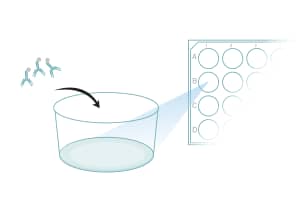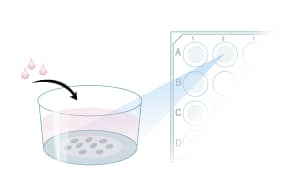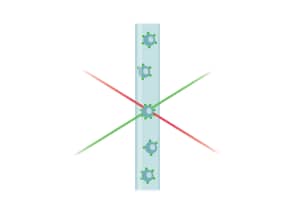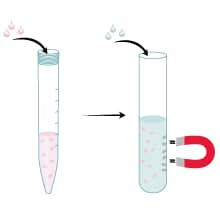CellXVivo Mouse Treg Cell Differentiation Kit
CellXVivo Mouse Treg Cell Differentiation Kit Summary
Kit Summary
For the differentiation of regulatory T Cells (Tregs) from a preparation of naïve CD4+ T cells.
Key Benefits
- Contains high quality bioactive proteins
- Yields a highly enriched population of FoxP3+CD25+ Treg cells
- Provides optimized reagents for inducing Tregs from CD4+ T cells
- Involves validated and straightforward procedures
- Does not require specialized instrumentation
Why Differentiate Treg Cells In Vitro?
Forkhead Box P3 (FoxP3)+ regulatory T (Treg) cells are a suppressive subset of CD4+ T cells that function to antagonize immune responses. Treg cells have the capacity to prevent potentially damaging autoimmune and protective immune responses, so the number of Treg cells is a crucial determinant of the regulatory burden on the immune system. In vitro differentiation of Treg cells from the larger naïve CD4+ T cell population provides increased numbers of Treg cells to facilitate downstream research.
This kit contains the following optimized proteins and reagents to drive efficient differentiation of naïve CD4+ T cells into FoxP3+CD25+ Treg cells.
- Hamster Anti-Mouse CD3 Antibody
- Mouse Treg Reagent 1
- Mouse Treg Reagent 2
- Mouse Treg Reagent 3
- Reconstitution Buffer 1
- Reconstitution Buffer 2
- Wash Buffer (20X)
Stability and Storage
Store the unopened kit at -20 °C. After opening the kit, the Human Anti-Mouse CD3 Antibody, Mouse Treg Reagent 1, and Mouse Treg Reagent 2 may be stored at 2-8 °C under sterile conditions for up to 30 days or at -20 °C to -70 °C in a manual defrost freezer for up to 3 months. Mouse Treg Reagent 3 may be stored at -20 °C to -70 °C in a manual defrost freezer for up to 3 months. Reconstitution Buffer 1, Reconstitution Buffer 2, and 20X Wash Buffer may be stored under sterile conditions for up to 3 months at 2 to 8 °C. Storage conditions are valid if used within the expiration date of the kit.
Specifications
Product Datasheets
Scientific Data
 View Larger
View Larger
Differentiation of CD4+ T Cells into Treg Cells Confirmed by FoxP3 and CD25 Expression. Naïve CD4+T cells were incubated without (A, B) or with (C, D) reagents included in the CellXVivo™ Mouse Treg Cell Differentiation Kit for 5 days. Cells were fixed, permeabilized, and stained using the FlowX Mouse Regulatory T Cell Kit (Catalog # FMC022). Cells were imaged using flow cytometry. Quadrants were set based on isotope-stained samples.
Assay Procedure
Refer to the product datasheet for complete product details.
Briefly, naïve mouse CD4+ T cells can be differentiated into Tregs using the following procedure:
- Coat a plate with Hamster Anti-Mouse CD3 Antibody
- Isolate naïve CD4+ T cells from mouse splenocytes
- Culture naïve CD4+ T cells in Mouse Treg Differentiation Media for 5 days
- Verify differentiation into Treg cells by flow cytometry
Reagents Supplied in the CellXVivo™ Mouse Treg Cell Differentiation Kit (Catalog # CDK007):
- Hamster Anti-Mouse CD3 Antibody
- Mouse Treg Reagent 1
- Mouse Treg Reagent 2
- Mouse Treg Reagent 3
- Reconstitution Buffer 1
- Reconstitution Buffer 2
- Wash Buffer (20X)
Reagents
- MagCellect™ Mouse Naïve CD4+ T Cell Isolation Kit (R&D Systems, Catalog # MAGH205, or equivalent).
- RPMI 1640
- Fetal Bovine Serum (FBS)
- β-Mercaptoethanol (2-ME)
- L-Glutamine–Penicillin–Streptomycin solution
Equipment
- Tissue culture flasks and/or plates
- Sterile deionized water
- Microscope
- Hemocytometer
- 37 °C and 5% CO2 incubator
- Centrifuge
Coat wells of a 24-well plate with Hamster Anti-Mouse CD3 Antibody.

Prepare a single cell suspension of mouse splenocytes.

Isolate human naïve CD4+ T cells from PBMCs (e.g., using magnetic cell selection).

Perform a cell count.

Suspend 0.5 - 1 x 106 naïve CD4+ T cells/mL in Mouse Treg Differentiation Media.
Culture the cells on plates pre-coated with CD3 antibody for 5 days.

Verify Treg cell differentiation by analyzing marker expression using flow cytometry.
Mature Treg cells are now ready for further downstream applications.

Citations for CellXVivo Mouse Treg Cell Differentiation Kit
R&D Systems personnel manually curate a database that contains references using R&D Systems products. The data collected includes not only links to publications in PubMed, but also provides information about sample types, species, and experimental conditions.
4
Citations: Showing 1 - 4
Filter your results:
Filter by:
-
Inhibition of pyruvate dehydrogenase kinase 4 in CD4+ T cells ameliorates intestinal inflammation
Authors: H Lee, JH Jeon, YJ Lee, MJ Kim, WH Kwon, D Chanda, T Thoudam, HS Pagire, SH Pagire, JH Ahn, RA Harris, ES Kim, IK Lee
Cellular and Molecular Gastroenterology and Hepatology, 2022-10-10;0(0):. 2022-10-10
-
tRNA-m1A modification promotes T cell expansion via efficient MYC protein synthesis
Authors: Y Liu, J Zhou, X Li, X Zhang, J Shi, X Wang, H Li, S Miao, H Chen, X He, L Dong, GR Lee, J Zheng, RJ Liu, B Su, Y Ye, RA Flavell, C Yi, Y Wu, HB Li
Nature Immunology, 2022-09-22;0(0):. 2022-09-22
-
Intermittent Exposure of Hypercapnia Suppresses Allograft Rejection via Induction of Treg Differentiation and Inhibition of Neutrophil Accumulation
Authors: YS Tzeng, YJ Peng, SE Tang, KL Huang, SJ Chu, SY Wu, CP Cheng
Biomedicines, 2022-04-01;10(4):. 2022-04-01
-
Augmenting ATG14 alleviates atherosclerosis and inhibits inflammation via promotion of autophagosome-lysosome fusion in macrophages
Authors: H Zhang, S Ge, B Ni, K He, P Zhu, X Wu, Y Shao
Autophagy, 2021-05-04;0(0):. 2021-05-04
FAQs
No product specific FAQs exist for this product, however you may
View all Cell Culture Product FAQsReviews for CellXVivo Mouse Treg Cell Differentiation Kit
Average Rating: 5 (Based on 3 Reviews)
Have you used CellXVivo Mouse Treg Cell Differentiation Kit?
Submit a review and receive an Amazon gift card.
$25/€18/£15/$25CAN/¥75 Yuan/¥2500 Yen for a review with an image
$10/€7/£6/$10 CAD/¥70 Yuan/¥1110 Yen for a review without an image
Filter by:


